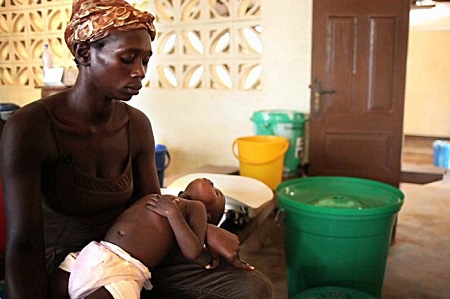Poor sanitation and open defecation, which continue to be the bane of the Ghanaian society, has robbed the nation of over 4,500 of its youth through the outbreak of diarrhoea in 2014 alone. According to a report by the United Nations International Children’s Fund (UNICEF), an additional 247 people died of cholera within the same year.
According to the report, poor sanitation, which breeds diarrhoea and cholera, cost the nation $290 million per year.
It said over 5 million of Ghanaian citizens do not have access to any toilet facility while over 20 million do not have access to basic improved sanitation.
Additionally, the country has been ranked second in Africa after war-torn Sudan with regard to open defecation.
The practice of open defecation does not only cost the country $79 million a year but also poses the greatest danger to human health and can have fatal consequences, particularly for the most vulnerable, including women and children.
Not surprisingly, the Upper East Region, which is regarded as the most deprived, has the highest open defecation rate of 89%, followed by Northern Region with 72% and Upper West with 71%.
The rest are Volta (25%), Brong Ahafo (16%), Central Region (15%), Western (12%), Ashanti (10%) and Greater Accra (9%).
It is also estimated that over 3,000 children in Ghana die annually from diarrhoea caused by lack of safe water, sanitation and hygiene.
The report was released ahead of the United Nations World Toilet Day, which was marked yesterday, November 19. The day is marked by thousands of people around the world in a bid to make sanitation a global development priority.
This year’s World Toilet Day highlighted the relationship between nutrition and sanitation, giving emphasis on the importance of toilets to support adequate nutrition and better health.
The goal of this year’s event is to educate people all over the world who do not have access to toilets, in spite of the human right to clean water and sanitation.
In a statement ahead of the celebration yesterday, Ban Ki-moon, the UN General Secretary, said poor sanitation elevates the risk of malnutrition and promotes the development of diseases. Women and young girls are prone to abuse and rape because of the lack of privacy that these makeshift toilet areas offer.
“We have a moral imperative to end open defecation and a duty to ensure women and girls are not at risk of assault and rape simply because they lack a sanitation facility.”
David Duncan, Chief Water, Sanitation and Hygiene (WASH) Officer at the United Nations Children’s Fund (UNICEF), has indicated that it was time government prioritised ending open defecation as it perpetuates the vicious cycle of diseases and entrenched poverty, which is evident in the recent cholera outbreak that claimed over 200 lives.
He observed that improved sanitation can reduce diarrhoea and its related deaths by 36% as well as prevent 20% diarrhoea-related stunting in children.
The UNICEF chief WASH officer further indicated that in order for the country to end open defecation, government must have a national plan that is supported by the presidency to facilitate a change in the social norm of open defecation to a point where using toilet facilities will be socially acceptable
Source: GhanaWeb














